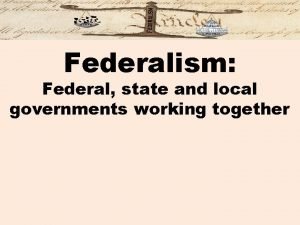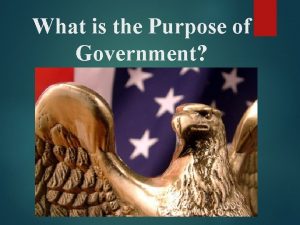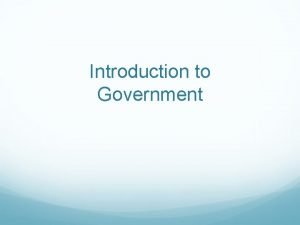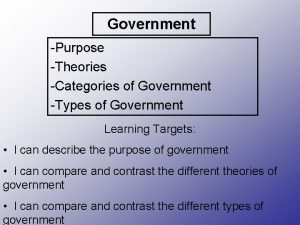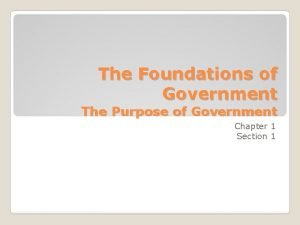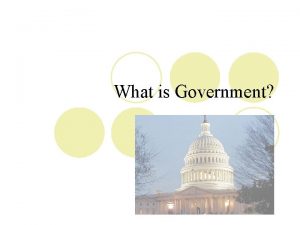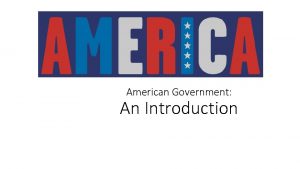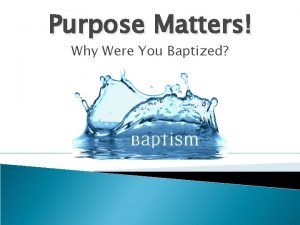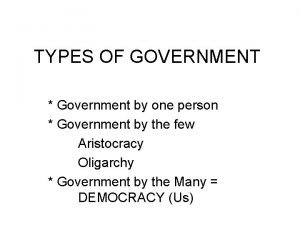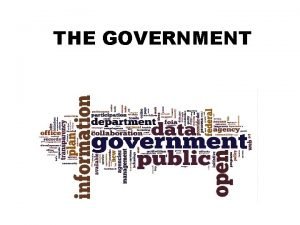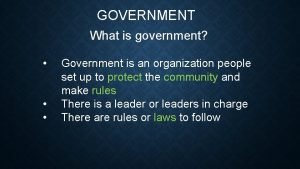What is the Purpose of Government Why do









































- Slides: 41

What is the Purpose of Government?

Why do we study government/civics? Imagine your life without government – what it would it look like? How would we be protected? Where would we get education/healthcare/etc. from? Learning about the government helps us to understand our rights and responsibilities as well as the protections that are put in place by our Constitution. “Civics” is the study of what it means to be a citizen. Civics is the study of our rights and duties as citizens. A citizen is a legally recognized member of a community nd a government.

Roman Citizenship The idea of “citizen” has changed over time. Romans used the term “citizen” to make distinctions about their people. Citizens were born in Rome Non-citizens came from other territories.

Today, citizens have rights and responsibilities that differ from country to country…. from one form of government to the next.

Citizens rights and duties of The citizens depend on their country’s government. For example, Israel requires all it’s citizens (men and women) to join the military. In Canada you must respect the dual languages of the nation (French & English)

Americans Are From Everywhere Our country has changed throughout the years as various groups have settled here from other countries around the world. People bring with them different languages, customs, beliefs, etc. People who come from other countries and intend to remain are called immigrants.

Great American Melting Pot

So Who Comes to America? Aliens are people who live in a country but are not a citizen of that country. An immigrant is an alien who plans to remain here. Immigrants (like citizens) are considered to be residents of the US – because they live here permanently or on a long-term basis. Today, most US immigrants come from Spanish-speaking countries.

Immigration Congress has the power to regulate immigration (according to the US Constitution). Beginning in the 1880 s, the government passed laws about immigration. An example of this Chinese Exclusion Act. In the 1920 s, laws established quotas to further limit the number of people admitted into the US.

Immigration Policy Today the Immigration Act of 1990 sets a total annual quota of 675, 000 immigrants permitted. Shift from mostly just “family ties” towards also “those who want to work and produce and contribute…” --- people with special skills, talents and money- have priority.

Who is a Citizen? th The 14 Amendment (1868) The “ 14 th Amendment” to the US Constitution defines a U. S. citizen as anyone “born or naturalized in the United States”

“Citizenship by Birth”

“Citizenship by Birth” Law of Blood – Jus Sanguinis The term native born is given to anyone who is born in the US or to American parents. By Blood or Soil Both parents are U. S. citizens. One parent is a U. S. citizen who lives in the U. S….

“Citizenship by Birth” Law of Soil – Jus Soil Born on U. S. soil, including, territories or military bases… Sometimes people can be “dual citizens” l According to the US Census Bureau – 87. 5% of Americans are native born.

“Citizenship by Naturalization” If you are not born an American citizen, you can go through the process of naturalization. Approximately 12. 5% of Americans are naturalized.

FIVE STEP “Naturalization Process” Step #1: Aliens must apply for a permanent residency visa (“green card”) and wait five years.

“Naturalization Process” Step #2: Aliens must apply for citizenship and file their “declaration of intention” with the United States Citizenship and Immigration Services (USCIS)… To apply for naturalization, you must be at least 18 years of age Albert Einstein’s Application

“Naturalization Process” Step #3: Aliens must get fingerprinted. Why do we think that this is an important step in obtaining citizenship?

“Naturalization Process” Step #4: “Aliens” must be interviewed and pass a citizenship test with the USCIS… All applicants must take the Citizenship Exam in ENGLISH… Basic knowledge of reading, writing, U. S. history, etc…

“Naturalization Process” Step #5: Once the applicants pass the “citizenship” exam, they attend a ceremony… Here, the new citizens pledge their loyalty to the U. S. and to obey the laws – Take “Oath of Allegiance”

“Oath of Allegiance” "I hereby declare, on oath, that I absolutely and entirely renounce and abjure allegiance and fidelity to any foreign prince, potentate, state, or sovereignty of whom or which I have heretofore been a subject or citizen; that I will support and defend the Constitution and laws of the United States of America against all enemies, foreign and domestic; that I will bear true faith and allegiance to the same; that I will bear arms on behalf of the United States when required by the law; that I will perform noncombatant service in the Armed Forces of the United States when required by the law; that I will perform work of national importance under civilian direction when required by the law; and that I take this obligation freely without any mental reservation or purpose of evasion; so help me God. "

Craig Ferguson Clip

Tuesday, January 10 th We will be taking notes today – have yours ready. HW: Current Events Presenters for next week – begin your preparations. Chapter 1 Quiz is tomorrow; Chapter 1 Packet is due Friday.

Review with your neighbor… 1. Define Citizen 2. Explain why we need a government 3. Identify 2 Rights and 2 Responsibilities of a U. S. citizen 4. Explain the 2 metaphors that have been used to describe the American people 5. Give an example of one law that defines U. S. citizenship 6. Give an example of one law that has impacted immigration in the United States 7. What are the 5 steps to becoming a naturalized citizen? 8. Name 10 Disney Movies (Try and guess my favorite)

Rights of Naturalized Citizens A naturalized citizen has all the same rights and duties as a natural-born citizen. Examples of Rights Hold jobs Run for election Serve on juries Vote Only exception – naturalized citizens cannot become the President!

“Legal Aliens” in America There are 21. 7 million legal aliens living in the US. A legal alien is a citizen of another country who has received permission to enter the US. “Legal Aliens” do NOT have full political rights… They can NOT vote, run for office, serve on juries, or hold most government jobs…

“Illegal Aliens” in America Approximately 11 million “illegal immigrants” live in the United States… (Dept. of Homeland Security) Most enter the U. S. illegally, and fail to have proper immigration documentation… Many enter the US in search of jobs, education, healthcare or a better place to raise their family.

“Illegal Aliens” in America “Illegal Aliens” who are caught can be deported back to their country… The U. S. “Border Patrol” is given the task of preventing illegal immigration… There is much debate about this issue with the current presidential candidates……

Refugees • Our immigration quota does not include refugees. Refugees are people who are trying to escape the dangers of their home countries – fleeing due to persecution, war, or other crisis situations. 1960 -1970 s – Cuban Refugees to Florida The President and Congress set quotas each year to allow a certain number of refugees into the US.

The Citizen & Government Citizens should be productive and active members of society. Good citizens should be loyal to their government. Each citizen is also entitled to protection by and from that government. This is the “Social Contract” that people have with their government – governments exist to protect the rights of the people and the people should respect the decisions of government.

What is government? A government is the organizations, institutions, and individuals who exercise political authority over a group of people. A government is created by a society and is used to enforce public policies (all the things a government decides to do). Public policy covers a wide variety of areas such as crime, safety, education, transportation, etc. A government provides leadership, maintains order, provides public services, provides national security, and provides economic safety and security.

Powers of the Government In order to make and carry out public policies, governments must have power. Legislative (make the laws) Executive (enforces/carries out the laws) Judicial (interprets the laws) The powers of any government are laid out in a nation’s constitution (written plan for government that sets up the fundamental policies and practices by the government functions).

Governmental Spectrum How much power and how much individual liberty exists within each government/nation depends on the kind of government exits. Dictatorship – power held/rule by one or few Democracy – power held/rule by the people Over the course of human history, “the state” has emerged as the dominant political unit in the world. We often times refer to the government that runs each nation as “the state”.

History of the Nation-State

The State The state is defined as a body of people that live within a defined territory and are organized politically (the government) and have the power the make and enforce laws without the consent of a higher authority. There are more than 190 recognized states in the world today and they vary greatly in terms of their size, form of government, military power, natural resources, population, etc. There are four main characteristics of a “state”” Population – states might be homogenous or have a variety of ethnicities, languages, etc. Territory – defined borders Sovereignty - supreme/absolute power that is not subordinate to another power. (The United States government vs. state governments) Government – every “state” must have a government; this is necessary to avoid “the war of every man against man” (Hobbs, 1600 s)

Major Political Philosophies There are different beliefs about how and why states form. There are four major ideas about the origin of the “state” The Force Theory The Evolutionary Theory The Divine Right Theory The Social Contract Theory

The Force Theory Believes that state was born of force Small group claims control and forces everyone else to submit Subscribes to “might makes right” and once everyone submits to that the “state” is formed.

The Evolutionary Theory Believes that state develops naturally out of the early family. Believers of this subscribe to the thought that power originated with the head of the primitive family (becomes viewed leader is the government) and over time as the family grows, and the clan turns into a tribe and a tribe roots itself, it becomes recognized as a state. Biblical examples (Christian, Jews, Muslim faiths recognize Abraham as “the father of many nations”)

The Divine Right Theory Widely accepted in Western societies from the 15 th – 18 th centuries. God created the states and had given those of royal birth the “divine right” to rule. People were to obey the ruler and therefore be closer to god. Defying the leader was a considered a moral sin and treasonous at the same time. 17 th century democracy will develop as a challenge to this theory.

The Social Contract Theory In terms of American political history, this theory is most significant. Prominent philosophers Hobbs, Rosseau, Harrington, Locke will begin to question Divine Right and challenge the notion of royal leadership. Hobbs believed that a government was necessary because we live in a state of “nature” – without government, “nasty, brutish, wild” behavior would ensue Locke believed that humans are born with natural rights (life, liberty and property) and that no government could take them away. At the same time, people must enter into a voluntary covenant with the government based on loyalty an protection. (social contract) In other words, these philosophers believe that the state exists to serve the will of the people. The Declaration of Independence will highlight these beliefs and change the shape of governments for states moving forward. (limited government, popular sovereignty, individual rights)

Purpose of Government The purpose of each government, regardless of its structure is generally the same. There are six main goals of American government – as indicated by the Preamble to the US Constitution. Form a more perfect union Establish justice Insure domestic tranquility Provide for the common defense Promote the general welfare Secure the blessings of liberty
 Hey bye bye
Hey bye bye Dont ask
Dont ask National government vs federal government
National government vs federal government Purpose of government
Purpose of government Hình ảnh bộ gõ cơ thể búng tay
Hình ảnh bộ gõ cơ thể búng tay Bổ thể
Bổ thể Tỉ lệ cơ thể trẻ em
Tỉ lệ cơ thể trẻ em Gấu đi như thế nào
Gấu đi như thế nào Chụp phim tư thế worms-breton
Chụp phim tư thế worms-breton Chúa yêu trần thế alleluia
Chúa yêu trần thế alleluia Môn thể thao bắt đầu bằng từ đua
Môn thể thao bắt đầu bằng từ đua Thế nào là hệ số cao nhất
Thế nào là hệ số cao nhất Các châu lục và đại dương trên thế giới
Các châu lục và đại dương trên thế giới Công thức tính độ biến thiên đông lượng
Công thức tính độ biến thiên đông lượng Trời xanh đây là của chúng ta thể thơ
Trời xanh đây là của chúng ta thể thơ Mật thư anh em như thể tay chân
Mật thư anh em như thể tay chân Phép trừ bù
Phép trừ bù độ dài liên kết
độ dài liên kết Các châu lục và đại dương trên thế giới
Các châu lục và đại dương trên thế giới Thể thơ truyền thống
Thể thơ truyền thống Quá trình desamine hóa có thể tạo ra
Quá trình desamine hóa có thể tạo ra Một số thể thơ truyền thống
Một số thể thơ truyền thống Cái miệng xinh xinh thế chỉ nói điều hay thôi
Cái miệng xinh xinh thế chỉ nói điều hay thôi Vẽ hình chiếu vuông góc của vật thể sau
Vẽ hình chiếu vuông góc của vật thể sau Thế nào là sự mỏi cơ
Thế nào là sự mỏi cơ đặc điểm cơ thể của người tối cổ
đặc điểm cơ thể của người tối cổ Thế nào là giọng cùng tên
Thế nào là giọng cùng tên Vẽ hình chiếu đứng bằng cạnh của vật thể
Vẽ hình chiếu đứng bằng cạnh của vật thể Fecboak
Fecboak Thẻ vin
Thẻ vin đại từ thay thế
đại từ thay thế điện thế nghỉ
điện thế nghỉ Tư thế ngồi viết
Tư thế ngồi viết Diễn thế sinh thái là
Diễn thế sinh thái là Dạng đột biến một nhiễm là
Dạng đột biến một nhiễm là Thế nào là số nguyên tố
Thế nào là số nguyên tố Tư thế ngồi viết
Tư thế ngồi viết Lời thề hippocrates
Lời thề hippocrates Thiếu nhi thế giới liên hoan
Thiếu nhi thế giới liên hoan ưu thế lai là gì
ưu thế lai là gì Hổ sinh sản vào mùa nào
Hổ sinh sản vào mùa nào


